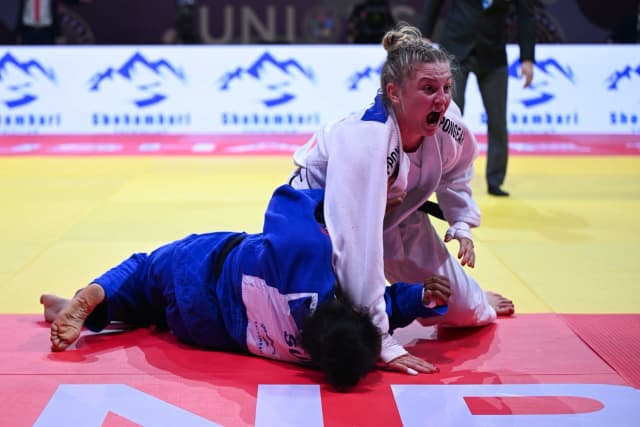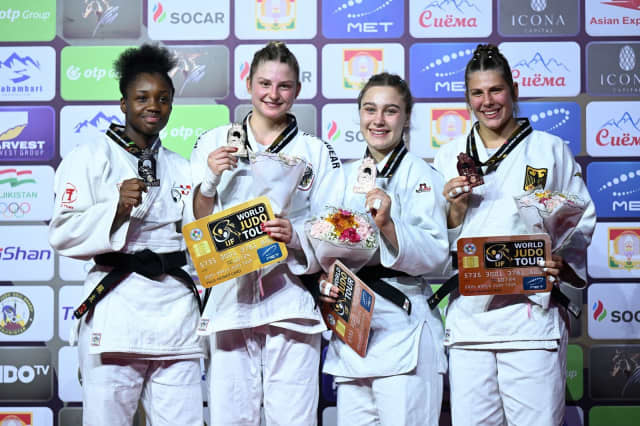Amid the noise and flags of the Kasri Tennis Arena, Cardoso obeyed her ranking all the way to the quarter-final where she met Rin Maeda of Japan and despite leading the gripping and forcing the Japanese judoka to take two penalties in normal time, when golden score came, Maeda unpacked her ne-waza skills and held the Brazilian for a place in the semi-final.
Pool B was won by Elena Dengg, often under pressure from her opponents but with the tenacity to withstand it. Her o-uchi-gari against Azamova (IJF) was particularly impressive against the physicality of her opponent.
Dengg Girrl! 💅
— Judo (@Judo) October 4, 2024
Follow all the action on https://t.co/5YYXyE0nko 💻#JudoJuniors #Dushanbe #Tajikistan #Judo #Sport #RoadToLA2028 pic.twitter.com/rXhZ3agSm0
The number two seed, April Lynn Fohou (SUI) looked uncatchable all morning. She threw and held Chayeb (LBN), dispatched Razzokberdieva (UZB) in the last seconds with a throw and hold, and in the same vein, threw and held Tayla Grauer (GER) in the quarter-final.
Fohou’s semi-final was against 6th seed Kaja Schuster (SLO) who came through the pool via two tactical wins and an osae-komi against 3rd seed Aina Laura Rasoanaivo Razafy (MAD). The Madagascan had thrown Ognivova (IJF) in round two, won tactically in round 3 and would give everything in the round of 8. It wasn’t enough though as Schuster held her down.
Dengg won the first semi-final by hansoku-make after Maeda attempted to throw through a straight arm and Fohou won the second semi-final with an incredible sukashi action, sending Schuster to the bronze medal contest.
In the first medal contest of the category Kaja Schuster (SLO) gave Huiting Yuan (CHN), who had defeated the number one in the repechage final, no chance at all, throwing with seoi-otoshi and holding immediately for two waza-ari scores. She made it look easy!
The second medal would be assigned to Grauer of Germany who had beaten the Madagascan athlete in the repechage, as Maeda was unable to compete in the final block.
In the final, April Fohou and Elena Dengg delivered a confident contest, both strong physically and mentally. Throws and counters came from both and the kumi-kata was unforgiving throughout. The Austrian went for a big o-uchi-gari with 1:45 to go, possibly the strongest attack of the match up to that point but still no score and no penalty to be seen.
As the time went on, Dengg began to look more dominant and at the bell was still with a clean sheet against two penalties on Fohou’s side. That trend continued and at 1:20 into golden score Dengg went for another o-uchi-gari. Fohou needed a solution and it was almost a well-timed sasae-tsuri-komi-ashi but the lack of finish prevented it from being scored.
It became a very long contest but it was far from dull, both giving everything for the title. The o-uchi-gari had threatened the Swiss fighter many times and in the end, after almost 8 minutes of mat time, Dengg made it work, throwing for waza-ari to become junior world champion. These women are totally ready for the transition to the senior level and there is no doubt we will see them both on the WJT very soon.
Final (-70 kg)
Bronze Medal Fights (-70 kg)









